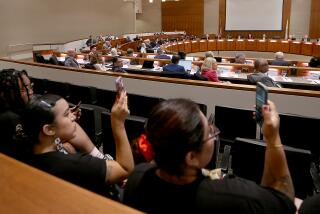Lottery Lifts the Fortunes of CSUN’s Visitors Program
- Share via
Martha Honey seems an unlikely beneficiary of the California Lottery.
Honey lives in Costa Rica and has never bought a ticket. In fact, she disapproves of gambling, preferring to spend her time working as a journalist and a fund-raiser for a lawsuit that charges several former U.S. officials with illegal activities in Central America.
Yet next year Honey will receive a 3-month respite from those activities, courtesy of the lottery, when she becomes the first distinguished visitor in residence at Cal State Northridge. Plans call for her to lecture in classrooms, speak before student and faculty groups, and keep office hours, when students can drop in to talk.
Although CSUN is awaiting the signing of a contract before making an announcement, officials last week confirmed the selection of Honey and said she and campus administrators have agreed to terms of the appointment. Honey is to arrive in late January.
The arrangement that will bring her to CSUN is a new addition to the lottery-funded distinguished visitor program, which is in its third year on campus. The program has paid for one-time appearances, bringing onto campus such speakers as syndicated columnist Ellen Goodman, humorist Stan Freberg, former Ram Pat Haden and Yolanda King, daughter of Martin Luther King Jr.
Bonita Campbell, assistant vice president of academic planning and resources, said CSUN established a visitor-in-residence program in part because of “very favorable feedback from other campuses that had distinguished visitors for extended times.”
In the current school year, Campbell said, CSUN has $60,000 to spend on one-time speakers. Some command fees as high as $7,000 and address an audience of hundreds, while others speak to a single class for as little as $100.
There is $50,000 available this year for a visitor in residence. School officials declined to disclose terms of the agreement with Honey until her signed contract arrives from Costa Rica, but sources said she will receive a stipend and expenses not exceeding $35,000.
CSUN has a total of $1.7 million in lottery funds for the 1988-89 school year. In addition to the distinguished visitor program, the money is used to buy instructional equipment, recruit and retain minority and disadvantaged students, and fund community-service student internships.
“We’ve always been under budget restraints, and the lottery funds to some extent free us from this,” faculty president Henry Abrash said of the visitor program. “I would much rather see lottery funds used in this way that in some sub rosa way to cover normal operating expenses.”
However, some faculty members have doubts about the program. Bryce McIntyre, assistant professor of journalism and this year’s chairman of the speaker selection committee, said lottery funds have created a growth industry that some speakers take advantage of.
“I especially resent Fred Friendly asking $7,500,” McIntyre said. “A journalist in particular should share information without charging exorbitant fees.”
Friendly, former CBS News president, did not speak at CSUN. However, columnist Goodman charged $7,000 for her talk.
Selection of Honey as the first visitor in residence went without controversy, campus officials said. She was nominated by the journalism department, with the selection approved by two faculty committees.
“She spoke at a faculty retreat last fall and gave such a strong talk people said, ‘Gosh, this woman is really brilliant and has a lot to offer,’ ” said Michael Emery, chairman of the journalism department. “She’s going to be invaluable to the women’s studies department, the history department, the journalism department--everyone, really.”
Speaking by phone from Costa Rica, Honey, 43, said her main goal at CSUN will be to explain Third World issues to students and faculty. Reporting of problems in underdeveloped countries is poor, she said, leaving most U.S. citizens uninformed.
She said she has covered Africa and Central America for ABC-TV, BBC radio, Canadian radio and the Times of London. Honey said she does not appear on the air, but does research and legwork, and takes crews to stories.
Honey said her husband, free-lance journalist Tony Avirgan, and children, daughter Shanti, 12, and son Jody, 8, will stay in Costa Rica.
In addition to her campus duties, Honey hopes to work on two books.
Honey and her husband are the plaintiffs in the Christic Institute lawsuit, which seeks to bring to trial 29 defendants--including ex-CIA operatives, Central American politicians and alleged drug lords--accused of various covert crimes. The suit grew out of a 1984 bomb explosion at a Contra news conference in Nicaragua that injured Avirgan and killed eight others.
The suit was dismissed in June by a U.S. District Court judge in Florida, and an appeal is pending.
Karen Kearns, instructor in CSUN’s radio, television and film department, was chairman of both last year’s speaker selection committee and one of the committees that recommended Honey for the visitor-in-residence post.
“Both these programs add a lot to the campus, and we wouldn’t be able to do either one of them without the lottery money,” Kearns said. She and others stressed that the funds are not tax money, but revenue from sales of lottery tickets and thus earmarked for education.
More to Read
Sign up for Essential California
The most important California stories and recommendations in your inbox every morning.
You may occasionally receive promotional content from the Los Angeles Times.










